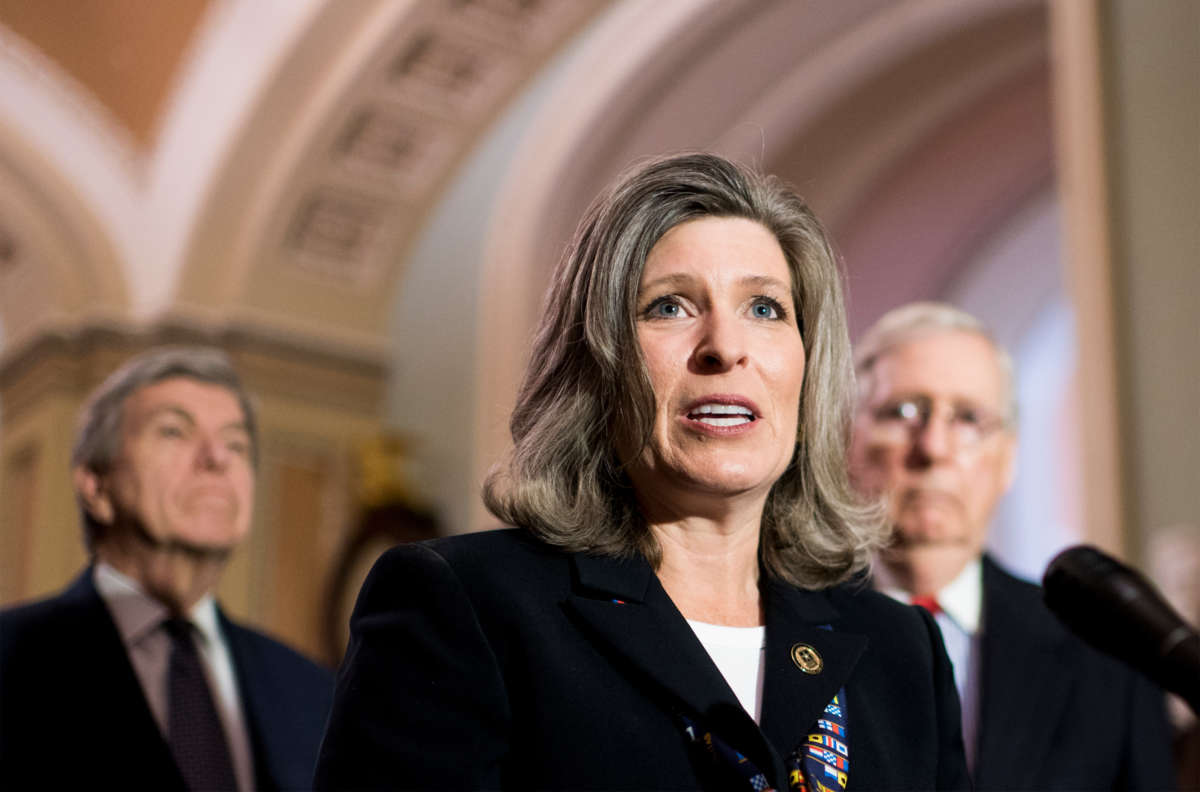Support justice-driven, accurate and transparent news — make a quick donation to Truthout today!
At this time last year, many believed that the chances for Democrats to win the Senate in 2020 were fairly mild. There was a possibility, prognosticators said, but it was going to be a very tight contest overall.
However, new polls for a number of races across the country — including in Iowa, where Republican Sen. Joni Ernst now appears to be vulnerable — suggest that the path for Democrats to take full control of Congress is stronger than was initially believed.
Ernst was first elected to her post in 2014, defeating her Democratic challenger Bruce Braley by 8.5 percent. Polling data from Public Policy Polling (PPP), however, shows that, for her first re-election campaign, the race is likely going to be much tighter.
In a matchup between Ernst and her Democratic challenger Theresa Greenfield, Ernst is ahead by just 1 point, earning 43 percent of support from Iowans versus Greenfield’s 42 percent. Those numbers are within the poll’s margin of error, which means the candidates are tied statistically at the moment to win the Senate race.
This is a significant difference from December 2019, when Ernst was ahead by about 6 points, PPP found.
Ernst’s vulnerability highlights a trend that, while not consistent for Republican candidates in all Senate races, is becoming more common, demonstrating that Democrats have a real chance to win control of the Senate later this fall, according to analysis from CNN’s Harry Enten last week.
If Joe Biden wins in November, Democrats would need to win three Senate seats in order to take control of the chamber. (Biden’s vice president could cast a tie-breaking vote.) If Trump is re-elected, they would need to win four. Beyond Iowa, there are four seats that appear to be possible pickups for Democrats: Arizona, Colorado, Maine and North Carolina. One other state — Alabama — may be a potential loss for the party, however.
Despite the possible loss, Enten’s analysis says Democrats’ chances of winning the “upper house” are pretty good. His findings suggest that there’s a 60 percent chance Democrats could win at least three Senate seats, and a 50 percent chance they could win four of them.
Enten’s look at the battleground states, however, didn’t include a look at Iowa’s numbers, since polling was limited there. If PPP’s new numbers hold up, though, it could seal the deal for a Democratic upset in the Senate.
Others are echoing Enten’s viewpoints on the status of the Senate races. Kyle Kondik, a political analyst at the University of Virginia Center for Politics, spoke to Al Jazeera about the matter. “At the start of the cycle, Republicans were favored to hold a majority,” Kondik explained. “At this point, it’s more of a 50-50 game.”
On the other side of Congress, Democrats look poised to retain control of the House of Representatives. In a recent Economist/YouGov poll conducted late last month, respondents said they’d rather have Democrats in control than Republicans by an 8-point margin.
Press freedom is under attack
As Trump cracks down on political speech, independent media is increasingly necessary.
Truthout produces reporting you won’t see in the mainstream: journalism from the frontlines of global conflict, interviews with grassroots movement leaders, high-quality legal analysis and more.
Our work is possible thanks to reader support. Help Truthout catalyze change and social justice — make a tax-deductible monthly or one-time donation today.
